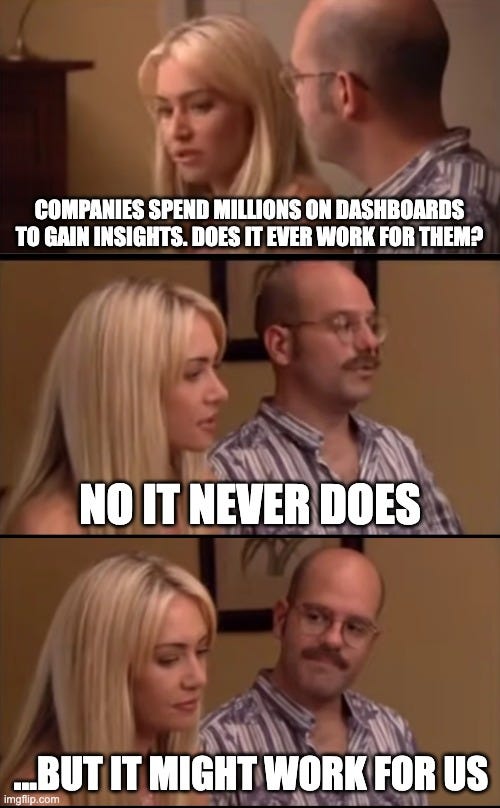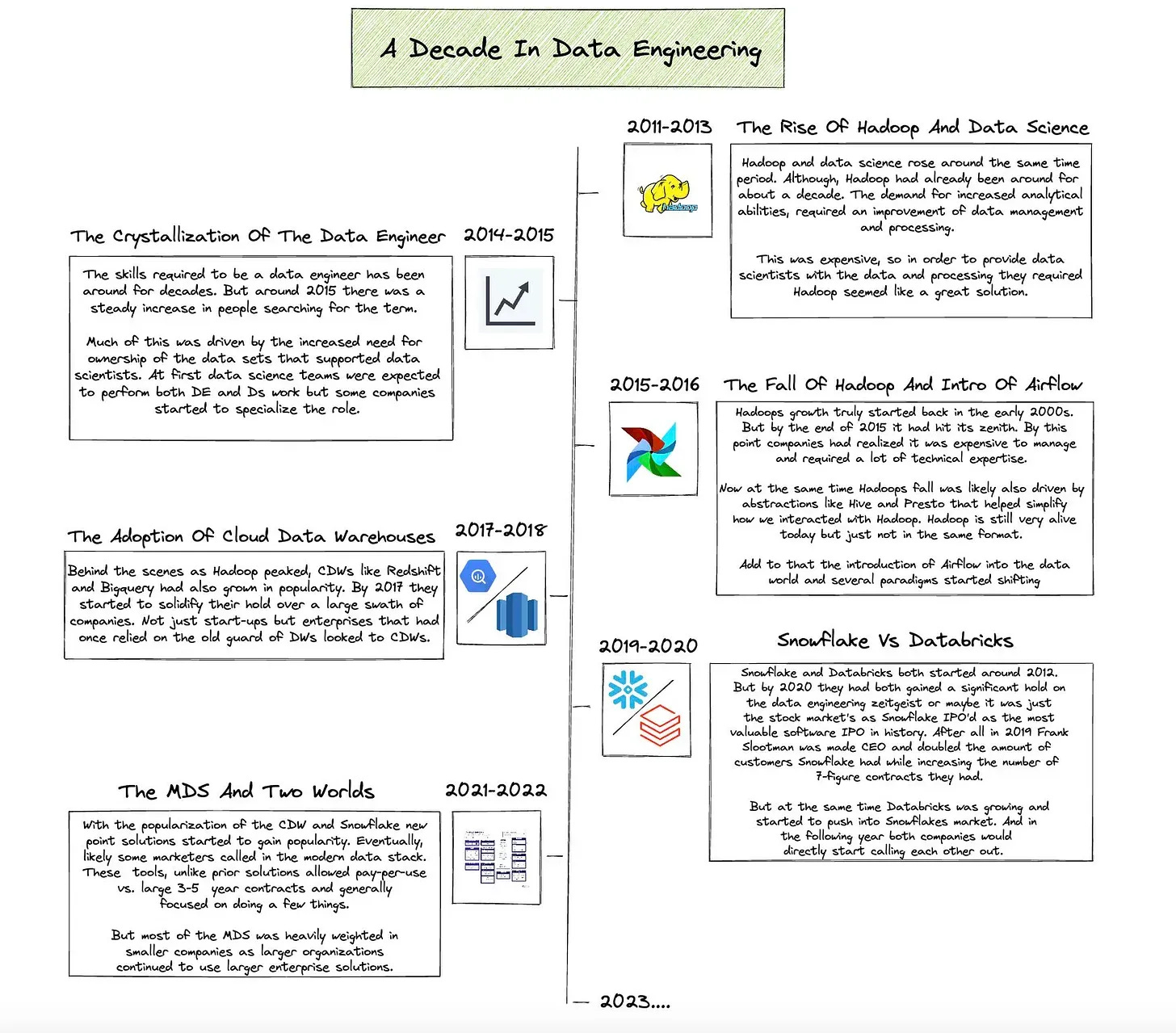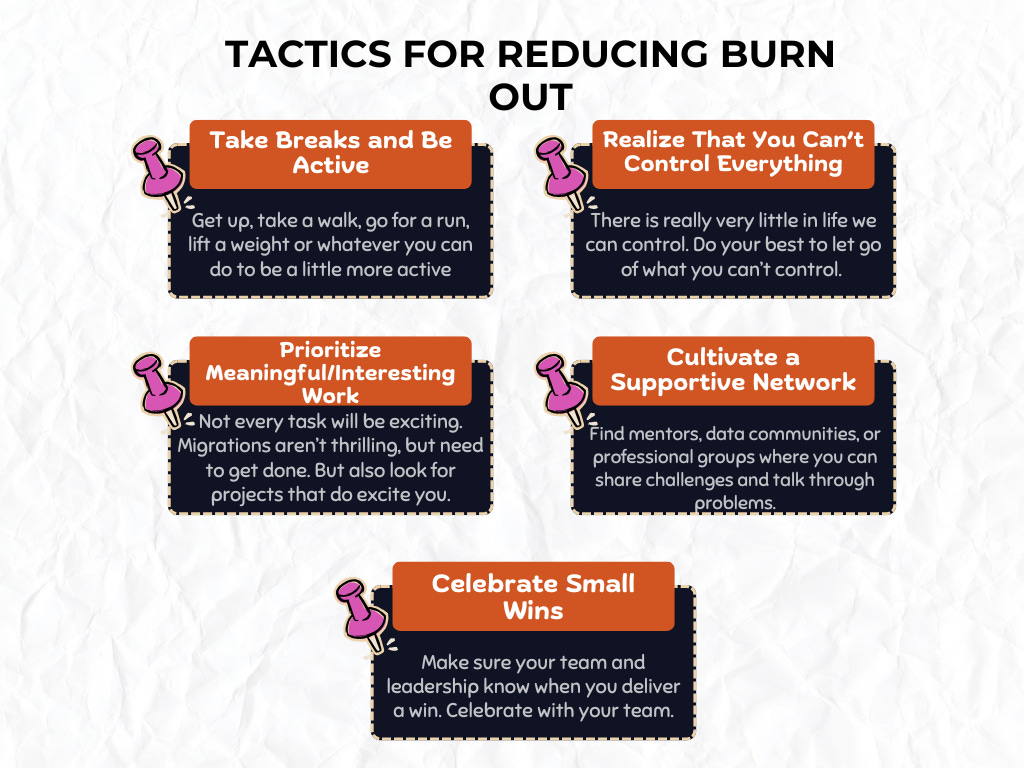Beyond The Hype: Data Teams Have A Burnout Problem
And Five Tactics On How You Can Keep It At Bay
Hi, fellow future and current Data Leaders; Ben here 👋
Today, we are going to talk about burnout. I’ve had several discussions with data leaders, engineers, and scientists who are all feeling more than a bit burnt out.
Before we dive into the article, I’m also excited to share that I’ll be running a 6-week program for data leaders starting March 10th focused on understanding the business better, choosing the right tools, and delivering impactful projects. If you’re interested, you can check out this free webinar I ran recently titled Understanding The Business - How To Find High ROI Data Projects, and sign up for the program here.
With that out of the way, let’s jump into it!
Intro
Data has a burnout problem.
Ok, it’s not just data. But there does seem to be something in the air. Conversations I’ve had, and ones I’ve heard others having in the data world, are filled with people feeling burned out.
In fact,
recently wrote an article that captured this feeling perfectly:“Burnout is a persistent feeling that no matter how hard you work, you aren’t making meaningful progress. It’s when the internal pressure to be productive and exert control bumps up against the immovable wall that is modern life.”
If you’re a data leader, a data engineer, or one of the other dozens of data roles that exist out there, then you’ve probably felt this firsthand, especially if you’re working for an organization that claims to be data-driven but doesn’t act like it.
Meanwhile, you’re expected to do more with less and less because AI and tooling will supposedly fix all of the bottlenecks, right?
And, of course, there’s always that business leader fresh from a conference convinced that your team should immediately implement some new hype term solution or best practice, because they saw a cool demo.
So, you show up every day, try to make a difference, try to push the boulder up the hill… but every morning, it’s back at the bottom.
That’s just the tip of the iceberg. Let’s dig into what's driving burnout in data teams, and, more importantly, what you can do about it.
Thousands Of Dashboards - But Not One Is Used

There’s something deeply satisfying about building something that people actually use. Whether it’s a house, a vegetable from your garden, or writing an article that changes someone’s perspective, the real reward comes when someone finds value in what you’ve created.
Unfortunately, in the data world, this isn’t always the case. It’s still far too common to pour time and effort into:
Dashboards
ML Models
…and then watch them sit untouched.
Thousands of them, across thousands of companies.
Maybe the business team never figured out how to integrate a model into their workflow. Maybe no one thought through how to make the insights actually usable. Whatever the reason, the end result is the same: you essentially built nothing(because no one really looks at your dashboard anyway).
The first time this happens, you brush it off. But if it keeps happening? It starts to feel like your work doesn’t matter.
I was lucky to work on several early projects where the work we did had an immediate impact detecting fraud and several other use cases. This was because that’s all the company I worked at focused on. Selling analytics. If people didn’t want to pay for the analytics, the company wouldn’t exist.
But at large organizations, it’s a different story. Many companies have thousands of dashboards, most of which no one even looks at. And that wears on people.
It’s that repetitive cycle of excitement (maybe this project will be the one!) followed by disappointment (no one is using it… again) that can quickly turn an engaged, motivated team member into a disgruntled one.
All the Risk, None of the Reward
There’s a lot of pressure on data teams to deliver useful, reliable data products. That’s the job, and it’s a fair expectation.
But here's the problem: when things go right, the sales or marketing team gets the credit, after all, they used the data well. When the data is wrong? Well, you better go punish the data team.
I’ve spoken with many data leaders, and the frustration is consistent:
When a dashboard or data product delivers valuable insights, business teams get the nod.
When numbers don’t match or look off, the data team is in the hot seat.
Of course, some of this is on data leaders, if your team drives meaningful business outcomes, make sure people know. Visibility matters. But too often, the work of data teams happens in the background, unnoticed until something breaks.
And that leads to the bigger issue: when your efforts aren’t valued and projects aren’t even utilized, burnout isn’t far behind.
It’s like you’re in some terrible ground hog day scenario where nothing really changes.
Overwhelming Waves Of Technology
In some ways, the data world hasn’t changed much over the last decade. In other ways, it never stops shifting.
Depending on where you’ve worked, you’ve either been lucky enough to stick with the same tech stack for years, or you’ve felt like you’re constantly drowning in new tools.
Eventually, this can become draining.
Just learned Teradata?
Time to learn Hadoop.
Oh, wait…Snowflake.
No, scratch that, maybe DuckDB?
Or maybe… something else entirely?
Not to mention AI, Airflow, dbt, Docker, Kafka…and whatever else just got hyped at the latest data conference.
It’s exhausting. No matter how much you try to stay ahead, the landscape keeps changing. Sure, some people love the constant evolution. But for others, it just feels like an endless rat race with no finish line.
Now, I will warn you, if you’re in technology, you do have to adapt, to a degree. But the key is to focus on the fundamentals. If you get the basics right, learning new tools becomes easier.
That doesn’t mean it won’t feel overwhelming. Just when you think you’re catching up?
Don’t forget to add LLMs to the list!
Of course, there are still other causes of burnout such as :
Simply just too much work
Poor work-life balance
Toxic work environments
etc.
But let’s change the subject to solutions.
Tactics To Reduce Burn Out
We’ve covered the biggest causes of burnout, but how do you fight it?
How can you stay sane and motivated in an industry that constantly demands more?
Truthfully, sometimes I just try to push through it, but that doesn’t always work. Everyone hits their breaking point.
When I start feeling like I’m losing control…trying to do too much, too fast, I know it’s time to take a step back and be honest with myself.
What do I actually want to accomplish?
For me, burnout often comes from saying yes to too many things. The more I take on, the less control I have over my time. For others, burnout might come from feeling like their work lacks purpose. Either way, recognizing the root cause is the first step in fighting it.
Here are five ways to reduce burnout and take back control:
#1 - Take Breaks and Be Active
So many data professionals I know, whether it’s
or Celina Wong, have some way of staying active.Some run up mountains, others climb walls, and others walk.
You don’t have to train for a marathon, but standing up and getting your blood flowing can break you out of doom cycles and spark new ideas. Even a gentle walk can reset your mindset.
#2 - Realize That You Can’t Control Everything
One of the hardest lessons for me was accepting that I can’t control every outcome.
Life—and work—is a lot like gardening. You can’t convince a plant to increase its yield simply by sheer will. You can give it water, provide shade, tend to the soil, and do everything right. But beyond that, it’s out of your control.
It’s the same with opportunities. You can position yourself for success, but sometimes things don’t pan out. And that’s okay. You have to keep trying, and keep doing your best.
#3- Prioritize Meaningful/Interesting Work
Not every task will be exciting. Migrations aren’t thrilling, but they need to get done.
But if your entire job is one tedious task after another, it might wear you down. Don’t get me wrong, some people love it. You might not.
Find work that interests you or feels meaningful. Experiment. Test ideas. Look for ways to make an impact, even if they’re small.
#4 - Cultivate a Supportive Network
There will be times when you can’t talk to your coworkers about certain struggles. That’s why having a trusted network outside of work is key.
Find mentors, data communities, or professional groups where you can share challenges and talk through problems. Your coworkers might be too close to the problem, an outside perspective can help.
(And no, this isn’t about leaking company secrets. It’s about having a safe space to get advice.)
#5 - Celebrate Small Wins
Let’s be real: if the only reward for doing great work is more work, most of us will lose it.
Make sure your team and leadership know when you deliver a win. Celebrate with your team. Take a moment to acknowledge progress.
We aren’t robots (yet). We need recognition, even for small victories. A reason to keep going. Otherwise, it’s just an endless cycle of grind with no payoff.
I’d also love to hear about your methods for managing burnout and stress.
Final Thoughts
There’s no perfect solution to burnout…especially when it feels like employers are constantly asking for more.
Burnout can stem from losing control, chasing speed, or feeling overwhelmed by the relentless pace of tech. When it starts creeping in, the best thing you can do is take a step back.
Take a breath. Life is long. You don’t have to become a Staff Engineer by 25. You can’t control every outcome. Sometimes, you just have to ride the wave and focus on what truly matters.
As always, thanks for reading!
Join My Data Engineering And Data Science Discord
If you’re looking to talk more about data engineering, data science, breaking into your first job, and finding other like minded data specialists. Then you should join the Seattle Data Guy discord!
We are now over 8000 members!
Join My Technical Consultants Community
If you’re a data consultant or considering becoming one then you should join the Technical Freelancer Community! We have over 1500 members!
You’ll find plenty of free resources you can access to expedite your journey as a technical consultant as well as be able to talk to other consultants about questions you may have!
Articles Worth Reading
There are thousands of new articles posted daily all over the web! I have spent a lot of time sifting through some of these articles as well as TechCrunch and companies tech blog and wanted to share some of my favorites!
Back To The Basics With SQL: Understanding Hash, Merge, and Nested Joins
If you’ve used SQL, you’ve likely encountered the basic joins.
Simplifying Ad Platform Analytics
In marketing, understanding Ad platform analytics and the performance of campaigns across multiple ad platforms like Meta (Facebook) Ads, Google Ads, Instagram Ads, and TikTok Ads is critical. However, each platform presents its own data structures, reporting frequencies, and integration challenges, making comprehensive analysis difficult and time-consuming. Analysts often find themselves bogged down with data extraction, cleaning, and normalization instead of focusing on extracting actionable insights.
Estuary Flow addresses these challenges by providing real-time, unified data integration from all major ad platforms. This article explores how Estuary Flow simplifies ad platform analytics through real-time data integration, enabling analysts to focus on insights, not data wrangling.
End Of Day 165
Thanks for checking out our community. We put out 4-5 Newsletters a month discussing data, tech, and start-ups.




I can't skip even one article of your newsletter.
It’s great to see how open the data community is becoming about burn out, it makes it feel more manageable knowing it’s not just a me thing. Do you feel like burn out in the industry has accelerated more since Covid or is it just becoming more recognized and talked about?